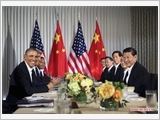
NATO adjusts its strategy for the Indo-Pacific region
Tuesday, May 30, 2023, 07:17 (GMT+7)
It can be seen that the expansion of NATO’s influence into the Indo-Pacific has been arousing concern for countries in this region, as it increases the risk of instability when the competition between China and the West becomes increasingly fierce, which has been predicted by international analysts and commentators.

Japan new security strategy and its impacts on regional security
Tuesday, May 23, 2023, 08:50 (GMT+7)
In order to safeguard its national security and interests, the Government of Japan has adopted a dual-pillar strategy: enhancing the independent and autonomous defence capabilities of its national self-defence forces and expanding defence and security cooperation with alliances and partners. To realise this strategy, besides the announcement of a new defence strategy with ambitious plans for the development of the self-defence forces, the Government of Japan also intensifies bilateral relations through the overseas visits of Prime Minister Kishida Fumio.

India in the U.S. strategy for the Indo-Pacific
Monday, March 27, 2023, 21:57 (GMT+7)
In the context that the world situation is changing quickly and unpredictably and the strategic competition among major powers is getting increasingly fierce, posing new challenges for countries, it is understandable that Washington and New Delhi are looking for similarities to strengthen their ties for their own benefits. International opinion holds that the strengthened U.S-India relationship will contribute to consolidating regional and global peace and stability.

The absurdity of the U.S annual human rights reports
Monday, October 10, 2022, 13:44 (GMT+7)
Implementing the good and progressive nature of the socialist democracy - a democracy of the people, by the people and for the people, Vietnam has always put people at the centre of all development policies in order to bring free, prosperous and happy life to its people. That is the consistent view of the Communist Party and State of Vietnam.

Bringing into play the Military’s politico-spiritual factor in non-traditional security challenge prevention and control
Tuesday, January 18, 2022, 08:15 (GMT+7)
In peacetime, natural disaster and epidemic prevention and control is seen as a “combat mission” of the Military. To successfully fulfil this mission, leaderships and commands at all levels should synchronously implement various measures, with a focus on building and improving cadres and soldiers’ politico-spiritual factor as a matter of importance and urgency

Shifts in US defence and security strategies in Asia-Pacific region
Friday, November 19, 2021, 08:38 (GMT+7)
Some great powers’ policy shifts and non-traditional security issues in Asia-Pacific region have made a great impact on security and core interests of many nations, including the US recently. Therefore, Washington has had some shifts in its defence and security strategies in order to maintain its global leadership role

The U.S. and the Philippines repair treaty alliance
Tuesday, October 12, 2021, 08:22 (GMT+7)
US-Philippines relations, which have come under strain over the past 5 years, have apparently warmed again as Philippine President Rodrigo Duterte has decided to fully restore the Visiting Forces Agreement (VFA) with the US of which he ordered revocation in February 2020. What caused their bilateral relations to turn sour and Manila to abruptly pivot back to Washington has drawn widespread attention

Nagorno - Karabakh, an unending conflict
Friday, December 11, 2020, 08:35 (GMT+7)
The complexity of geographical disputes and the overlapping relations make the Nagorno-Karabakh issue beyond the scope of a local conflict. Several external factors directly relating to the war are turning Nagorno-Karabakh into a node in international competition.

About new model of relationship among big powers in the world politics today
Wednesday, March 12, 2014, 10:19 (GMT+7)
Entering the year 2014, although global politics remained stable, competition among countries will take place severely, especially among big powers. In addition to “co-existence” with intentions, dissent, big countries do not forget to “nurture” their ambitions, waiting and taking advantage of opportunities to act in their most beneficial manner. Is this the trend of “a new type of relationship among major powers?”